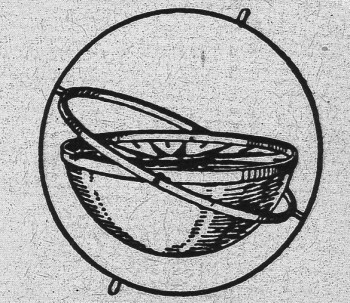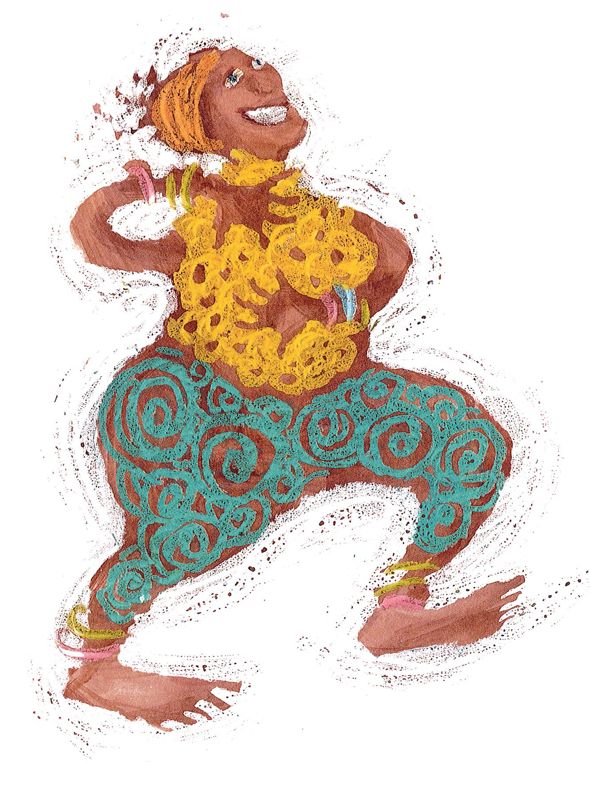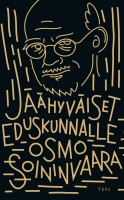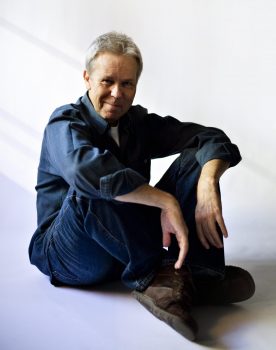Search results for "2010/02/let-us-eat-cake"
Until the sun rises
30 September 2000 | Archives online, Fiction, poetry
Poems from Rakkaus tuli kun lähdin maan ääriin (‘Love came when I left for the ends of the earth’, Tammi, 2000). Introduction by Helena Sinervo
metaxy, like summer
The moon strokes boulders
Left warm by the day, examines
The granite, passion gone tepid
Descends from its solitude
Into sea-carved channels More…
The forest and us
30 June 2008 | Fiction, poetry
Poems from Kerttu ja Hannu (‘Gretel and Hansel’, Tammi, 2007). Introduction by Anselm Hollo
In the emptiness
When we were children. We went to sleep in our father’s and mother’s bed. I got father’s sweaty side. You got mother’s fragrant blankets. We dreamed pale green spherical cloud dreams in wrought-iron beds and burnt our fumbling paws on the red-hot shade of the night light. We did not know. That this downy softness wouldn’t last. The rooms were always large and the big people were big and there was no sin. More…
The pursuit of happiness
30 June 1996 | Archives online, Fiction, Prose
Extracts from the novella Ilo (‘Joy’, Helsinki Media, 1995)
‘The flower is a characteristic feature of the highest group of the plant kingdom – the flowering plants – and is the name given to the association or organs, more or less leaf-like in form, which are concerned with the production of the fruit or seed.’
Encyclopaedia Britannica, 1910
The encyclopedia made us happy. But what was happiness? That the encyclopedia did not say. You had to set out to look for it. Our exploratory party represented the highest achievements of the field: it would be difficult to find a more serious or committed group.
When we waved to the people cheering on the quay, we were overcome by a strange feeling. It was as if we had already arrived. I made the mistake of speaking my thought aloud.
‘It will all end in tears,’ remarked our welfare officer, Mrs Rose. The atmosphere was ruined. What a pity that our quick-witted Doctor Stratelli was not present at that moment! For it was he who solved the problem of happiness.
Leave and stay
19 December 2011 | Fiction, poetry
Butterflies, metamorphoses, burial and remembering are the recurrent images in Henriikka Tavi’s third collection, entitled Toivo (‘Hope’). Introduction by Mervi Kantokorpi
Poems from the collection Toivo (‘Hope’, Teos, 2011)
Mourning cloak
I will tell you, though you cannot hear it.
This is a story that you will come to forget.
I have gone, but there is no departure. And as
the meadow of absence begins to lapse into grief:
Do not grieve.
I was here a moment ago and
soon will be between the dermis and the epidermis.
I stand in a row behind myself; I am a memory of you.
Oh, you weak spark! You powerful
desire to turn into a fortune!
You were the crowd in my head.
I am serious, you only imagine me.
Don’t disappear. Leave and stay.
I’ll be no further than this. More…
Back to the sources
23 October 2014 | Essays, Non-fiction, On writing and not writing
In this series, authors discuss the difficulties of their trade. Jari Järvelä finds it difficult to stop gathering source material which then gets piled in towers on his desk and in sacks around it. He knows that it’s got to stop though – for when it does, the stories will finally emerge, and life is a bliss… for a moment
When I was younger I thought that writing a novel began with the moment when I sat down at my desk and pressed a key for the first time. A. Hmmm…no, H. No, let’s make that S. No no no, I need a more original beginning…Z!
That’s not the case. The writing of a novel begins between two and twenty years before the choice of the first letter and the first word. Sometimes longer.
In the case of my novel Särkyvää (‘Fragile’, 2014), I know the exact moment of its birth.
Before I began to make a career as an author, I spent a year as a teacher at Hamari school in Porvoo. It was the beginning of the 1990s. Hamari was an old sawmill community on the sea, full of wooden houses more than a century old and motor boats put-putting toward the horizon. The headmaster looked more like a sea dog than a teacher; one morning he announced that it was his fortieth birthday. After that he sat down on the staff-room sofa, fell into deep thought and suddenly ejaculated, ‘Why the hell does a person have to gather so much junk in their life?!’ More…
Plain sailing
31 March 1996 | Archives online, Fiction, Prose
An extract from Alastalon salissa (‘In Alastalo’s parlour’, 1933). Introduction by Kai Laitinen
A letter from the translator:
Dear Editors,
Reluctantly (I really have tried) I have been driven to conclude that Alastalon salissa is untranslatable, except perhaps by a fanatical Volter Kilpi enthusiast who is prepared to devote a lifetime to it. To mention only one of the difficulties, there is no English equivalent to the style of the Finnish ‘proverbs’ (real or imaginary) with which the main character Alastalo’s thoughts are so thickly larded. Add to this the richness and, yes, eccentricity, of Kilpi’s vocabulary, and the unfamiliarity of much of the subject-matter, centred as it is on the interests of a sea going community that hardly exists any longer, even on the islands, and you have a text that is full of pitfalls for the translator. As for the humour, I’m sorry to say that it depends so much on the idiom and presentation that it doesn’t come over at all. If I did any more, I’m afraid it would just have to be a laborious paraphrase, and I don’t think I’m capable of making it effective, or even readable, in English.
Apart from that, although I’m very grateful for your explanations of the many unfamiliar words and phrases, I’m very unwilling to commit myself to the translation of any of them on the basis of a mere ‘gloss’ (technical word): I need to know the associations, and possible sound-echoes, of every one of them before I can be sure of getting it right. And getting it right affects the rhythm of every sentence: it’s not just a matter of filling in blanks with ‘equivalents’ provided by someone else.
I’ve no objection to your using my version of the opening pages. If you decide to follow it with some kind of comment, do borrow, if you need to, from my remarks above, giving the translator’s point of view. Sorry to have failed you so badly.
Yours, David Barrett More…
Location, location, location
11 February 2013 | Articles, Non-fiction

Before GPS: compass and and gimbal, 1570. Picture: Wikimedia
Art that requires navigation systems? Whatever next. In his column poet and writer Teemu Manninen wonders whether literature can function as ‘locative’. How to blend technology and art? Perhaps literature too might expand from the printed word
What if the Romantic poet John Keats had never published his poetry in print – if his works had been distributed only in manuscript form and read only by his friends and acquaintances? Had that been the case, the only way of hearing his poetry would have been at the salons and informal clubs that took place in literary people’s homes, at coffee houses, or other meeting places.
Keats might not even have, most likely, been in attendance himself, but maybe someone had a copy of a copy of a fragment of a poem that they might read to the gathered intellectuals and gentlefolk. You would have to have known the right people, have to have been at the right place at the right time to hear ‘Ode to a Nightingale’ read for the first and perhaps for the last time ever.
Or, what if Joyce had never intended for Ulysses to be published for the great reading public at all? What if, instead, he had left copies of each chapter around Dublin in the places where those chapters take place; what if, page by page, he had distributed his work in the actual locations of the events as they happened in his imagination? More…
Older and wiser?
9 October 2012 | This 'n' that

Illustration: Virpi Talvitie (from Täyttä päätä. Runoja ikääntyville, ‘Full steam ahead. Poems for ageing people’, edited by Tuula Korolainen and Riitta Tulusto)
Nobody can claim that old age is hot, or media-sexy. Yes, but what are older people really like? Are they the bingo-obsessed grannies in floral frocks or old geezers living in the past of popular opinion?
No longer. In just a few years the baby-boom generation will be entering their seventies, when ‘old age’, in its current Western definition, begins. (Until then, senior citizens are allowed to remain ‘adults’.)
Are the old people’s homes ready for them? This new elderly generation will be wanting to listen to Elvis, the Rolling Stones and the Beatles rather than the tango. More…
The Session
30 June 1982 | Archives online, Fiction, Prose
Pappas flicka (‘Daddy’s girl’, 1982), an extract of which appears below, is published in Finland by Söderstrom & C:o and in Sweden by Norstedt. The Finnish translation is published by Tammi. Introduction by Gustaf Widén
At first I say nothing, as usual.
Dr Berg also sits in silence. I can hear him moving in his chair and try to work out what he’s doing. Is he getting out pen and paper? Or perhaps he has a tiny soundless tape-recorder he is switching on.
Or is he just settling down, deep down into his armchair, one leg crossed over the other, like Dad used to sit? I used to climb up on to his foot. The he would hold my hands and bounce his foot up and down, and you had to say “whoopsie” and finally with a powerful kick, he would fling me in the air so that I landed in his arms.
I have worked it out that the little cushion under my head is to stop us lunatics from turning our heads round to look at Herr Doktor.
It would certainly be nice to sit bouncing up and down on Dr Berg’s foot. His ankle would rub me between my legs …
I soon start feeling ashamed and blush.
“Mm,” says Dr Berg, as if reading my thoughts. Or can he see my face from where he is sitting? I try rolling my eyes up to catch a glimpse of him, but all I can see is the ceiling with all its thick beams.
“I seem to have been here before,” I say. More…
Osmo Soininvaara: Jäähyväiset eduskunnalle [Farewell to Parliament]
23 June 2015 | Mini reviews, Reviews
 Osmo Soininvaara
Osmo Soininvaara
Jäähyväiset eduskunnalle [Farewell to Parliament]
Helsinki: Teos, 2015. 247pp.
ISBN 978-951-851-649-4
€33, hardback
Long-time member of the Finnish Parliament Osmo Soininvaara, who has also worked as a minister, decided not to participate in the 2015 parliamentary elections. In this timely book, this expert in social politics and influential figure in the Green Alliance examines the reasons for political alienation, analyses politics more broadly and presents his own medicines for improving the situation. According to Soininvaara, the Finnish parliament has become superficial and publicity-seeking and there is much room for improvement in its work. The six-party ‘rainbow coalition’ of the outgoing parliament was incapable of action and the two largest, leftist, parties were continually at loggerheads, with the Social Democrats, in particular, demanding reforms. The divided opposition was toothless. Finland’s economy weakened still further, and it proved impossible to implement the administration’s central projects, reform of the social and health systems and of municipal administration, let alone others, among them the structural administrative changes essential for economic recovery. Writing fluently, Soininvaara examines politics and Parliament from many different perspectives, arguing eloquently for his views.




